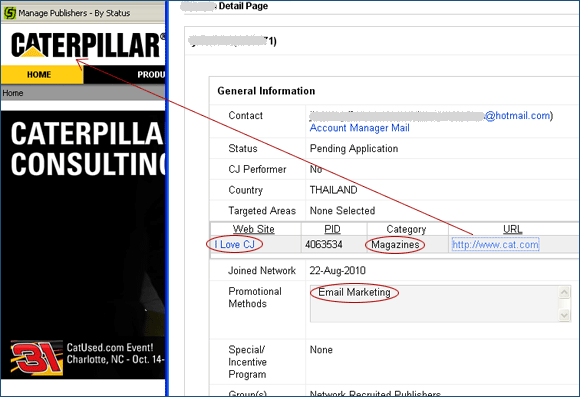Today I’ve had Caterpillar apply into an affiliate program I manage. At least so it looked from the URL on the application. Had it happened 5 or 6 years ago I would have probably even gotten excited about it. But not today.
As an affiliate program manager you do not want to get too excited if/when a huge website applies to join your program as an affiliate. First of all, you want to verify site ownership (for example, ask them to send you an email from an @hugebrand email address, or provide you with one at which you may reach them), and only once their association with the website has been established, you can celebrate.
In the case that I’ve started with, things were way too obvious right from the start. Here’s that affiliate application:

- Red flag #1: mismatch between website name (“I Love CJ”) and URL (www.cat.com)
- Red flag #2: mismatch between category chosen (“Magazines”?!) and the URL
- Red flag #3: “email marketing” indicated as the only promotional method, which mismatches all of the above (website name, category and URL), and in light of all of these red flags, brings only one word to my mind: “spam”
…not to say that the application originated from Thailand, and the applicant joined the affiliate network only a month and a half ago.
Affiliate usage of not-their-own URLs happens day in and day out. Not all of these applications will be from rogue affiliates (say, some may mention google.com implying that they will promote you through SEM endeavors), but in most cases it should raise a red flag, and the program manager should either request additional verification (as explained above), or, when things are obvious without any additional verifications, decline such an application right away.
Nice write up, Geno. Minus the exception you mention (paid search Affiliates using Google) it’s definitely a red flag. In fact it’s one of the reasons that each new Affiliate applicant has to authenticate the ownership of their site as step one when applying to AvantLink. People that lie or cheat to gain access to an Affiliate program…hmmm.
Gary, thank you for chiming in. I was waiting for someone to point to that exception. I still stand by my words though, and let me explain why.
I have burned myself in the past, declining applications of SEM affiliates (who have listed a search engine on their profile) right away. Bad practice. They may be a great PPC marketer, but not really sure what to enter in that field while setting up their profile. While I myself strongly encourage each affiliate (regardless of the primary promotional method used) to have a separate web(site)/(page) where they would explain how exactly they work as an affiliate, I have to be ready for situations when this won’t happen.
Yes, any not-their-own URL is a red flag, but not all of them should translate into a ban/rejection.
I don’t think any major company would use an @hotmail.com email address either.
Good point, Mike. I wanted someone to bring this up (and that is why I haven’t erased it while erasing the part before the @ sign), and it’s funny it was an affiliate (you) who pointed to this. I think affiliate opinions may actually split on this one. I’ve seen many (if not most) affiliates preferring @gmail, @hotmail and other free email services to email addresses on their own domains. That may also explain why the open rate of my CJ newsletters is so low (only between 11.5% and 15.5%) though.
Thanks, Geno. I know Gmail, Yahoo!, and other “free” email services are convenient but I personally think they look less than professional on a business card. For a very small fee (and it’s often bundled with hosting) one can have the webmail and other conveniences of these free services but with his or her own domain name. Or, if someone really wants to use these free email services then they can autoforward their own email@theirdomain.com address to that service.
…and I fully agree with you, Mike, and again, good to hear this from the mouth of an affiliate.